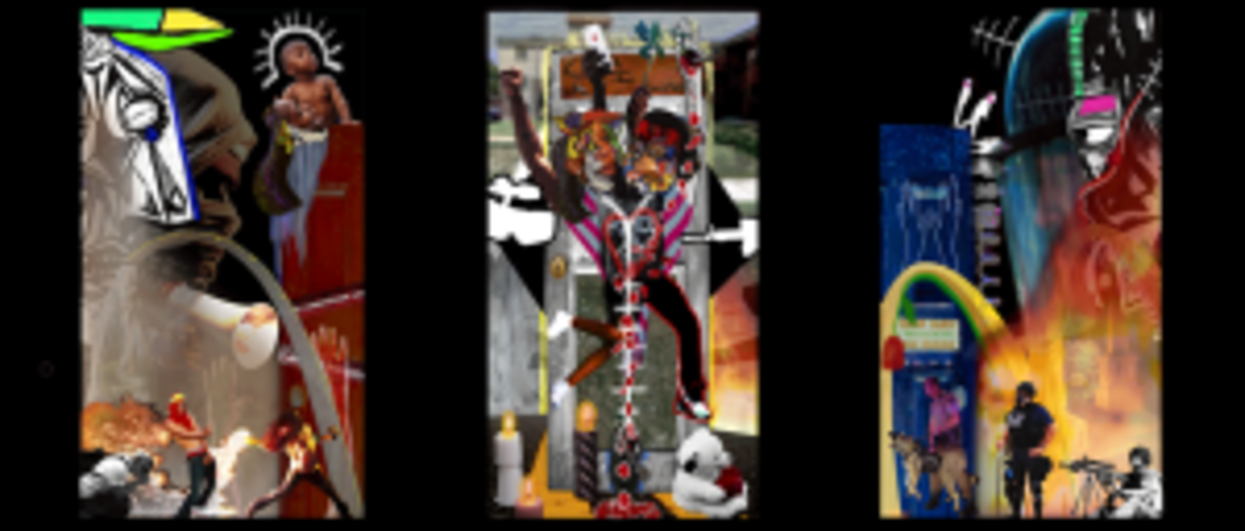Meet John Scott

He may not have taken an art class since middle school, but John Scott is changing the landscape of arts education through online learning. A graduate student in the Department of Education and DE in New Media, John explores the potential for online learning environments to increase geographic and cultural connections and build diverse communities.
John attended New York University, where he received a Bachelor of Arts in political science with a focus in political philosophy — not the most typical background for the field in which he now works! His junior year, however, he studied abroad in Florence, Italy, and was so inspired by city’s art that he began to branch out from text analysis into visual experimentation. Painting daily with cardboard boxes as canvases, among other salvaged materials, John developed a style around simple forms and narratives that generate conversation about social issues and philosophical ideas. Upon graduation, rather than pursue a traditional career with his degree, John immersed himself in New York’s Lower East side arts milieu, absorbing his artistic education through the area’s active community.
Spurred by his art interests, John worked as a substitute history teacher in a secure juvenile detention center. There, he was encouraged by the assistant principal to introduce art into the curriculum to motivate students, many of whom had not fared well in the traditional classroom setting. After John found an old version of iMovie on a computer for the students, he began producing films with his classes and soon discovered his passion for teaching and digital video art. The experience motivated him to apply to Ph.D. programs to study the role of art and storytelling in education.
Scott began his Ph.D. at NYU, where he collaborated with Glynda Hull on Space2Cre8, a virtual after school creative arts program that connects students from across the globe via a social networking site where they post digital movies to share with their peers. Working on the project, John became intrigued by the potential of online education to create environments of connection and transferred to UC Berkeley.
At UCB, John has plunged into the radical set of education tools at the heart of MOOCs, which allow access to new audiences and offer new types of metadata tools for examining and understanding student learning. Still, he’s very aware of the challenges with which MOOCs continue to struggle. In fact, his Berkeley Eisner Award in Film and Video, @Berkeley:#MyFirstMOOC, is a satirical exploration of the MOOC experience from a student’s perspective. While many of the issues he points to in the short (lagging software, stale material, closed circuits that do not offer room for creativity) can and are being fixed (by John himself through novel bCanvas tools, in some cases!), John continues to find cause for concern over questions of content provision and management. The challenge for MOOCs, he argues, is to expand content to maximize diversity of dissemination and active production of knowledge rather than monopolizing content and creating closed information communities.
The BCNM has provided John with a space to experiment with these ideas. In 2013 John participated a BCNM/CITRIS hackathon to develop a college readiness app. John's team was selected as one of three winning ideas, and was later selected for funding. This lead to the creation of a BCNM course, where undergraduates participated in a startup simulator in developing the PIC your Future college readiness web app. Most recently, John also co-taught a high school class inEducation Partnerships PreCollege Academy summer program, where he mentored students from varied disciplines and backgrounds as they worked together, building business, technical, and communication skills to deployed their creation.
John has also served as a GSI for BCNM Director Greg Niemeyer’s American Cybercultures online course and recently represented BCNM at the UC Engage online learning conference. He’s also collaborated on a variety of projects around media and social justice, including Ken Goldberg’s Rashomon Project, which organizes media around human rights issues, and California Report Card, which facilitates Californian participatory democracy. Amidst his extensive engagement in these programs, John somehow still manages to find time to pursue his own art practice, and in 2014 his digital art piece MoFerguson was selected to be part of the Virtual Relocation exhibition at the Goethe Institut San Francisco as part of the BCNM sponsored Image as Location festival. Ever one to find new connections in unlikely spaces, John made contact with the organization responsible for the competition’s platform, NewHive, and soon he began conducting ethnographic studies on the participatory nature of online art as well.
Currently, there are over 125 students actively using the BCourse tools John helped to develop in an undergraduate education course called "The Art of Making Meaning." Transferring the knowledge he gained in his study of digital learning and art, John has designed a new kind of online learning experience that tries to cultivate critical inquiry and creative action.
For more information on John, visit http://johnscottworks.com/
